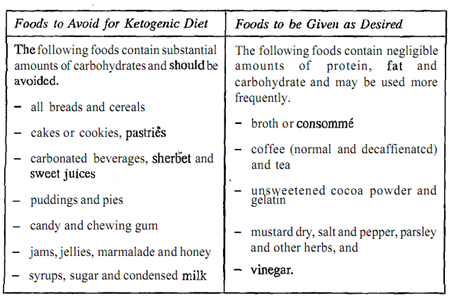Define the Dietary Recommendations for epilepsy?
A 3: 1 ketogenic diet is recommended. The time taken for reversing the usual ratio of 1:3 to 3: 1 is about 4 days. How will we know if our ketogenic diet is working? Very easy, just test the urine for ketone bodies. There are a few foods to be avoided in a ketogenic diet. These are listed in Table along with those foods which may be given as desired.

For preparing meals you could choose one of the following food/food items:
- Meat/cheese, chicken (30 g), egg (I), fish (50 g), cottage cheese (50 g), processed cheese (30 g), pulse (30 g)
- Cereal: bread (25 g), wheat (20 g), crackers (20 g), rice (50 g cooked). Noodles (50 g cooked)
- Vegetables (100 g): beans, broccoli, cabbage, cauliflower, cucumber, eggplant mushrooms, mustard greens, radish, spinach, tomatoes, turnip.
- Fats: Butter (5 g), cooking fat (5 g), nuts-almonds, walnuts (5 g), whipped cream (60 g)
- Fruits: Apple (40 g), apricots (60 g), banana (30 g), gooseberries (50 g), cherries (40 g), grapes (40 g), orange (100 g), mango (35 g), melon (100 g), papaya (60 g), peach (60 g), pineapple (40 g), plums (40 g)
- Milk: Butter milk (120 g), skimmed milk (120 g).
With these dietary recommendations we end our study of epilepsy. Finally, let us review the neuro trauma and the spinal trauma and the nutritional management of patients suffering from these traumas.